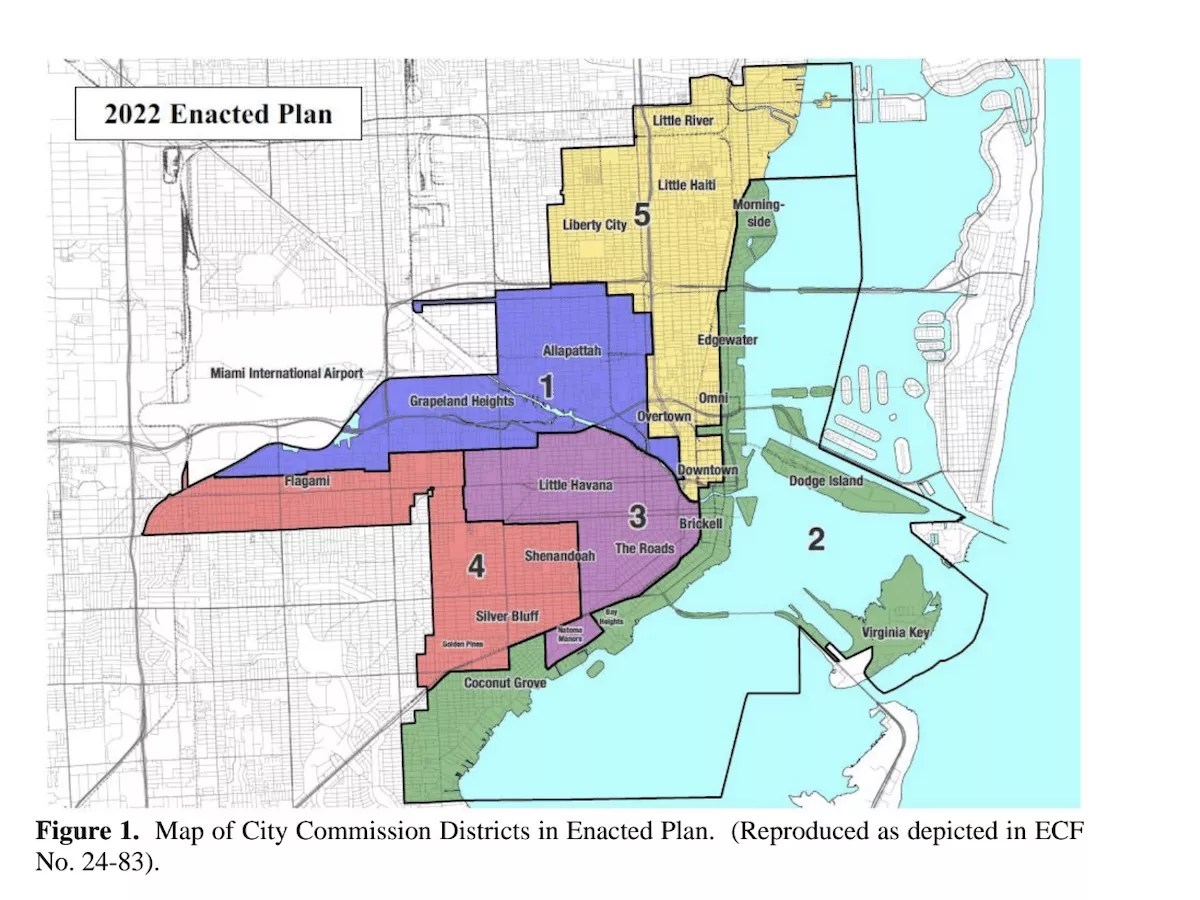
Photo by Owen Byrne/Flickr

Audio By Carbonatix
A federal magistrate judge has recommended blocking the City of Miami’s hotly contested redistricting plan, citing how officials openly encouraged racially driven decisions in drawing voter districts, with an eye toward preserving power dynamics on the city commission.
In a May 3 report handed down in a federal lawsuit against the city, U.S. Magistrate Judge Lauren Louis found that Miami commissioners engaged in clear racial gerrymandering while redrawing the five-district map set for use in the upcoming November election.
As noted in the report, Commissioner Joe Carollo unabashedly discussed his desire to keep districts mapped to ensure that one Black commissioner, one “Anglo” commissioner, and three Hispanic commissioners would be elected to the five-member city commission to represent major demographic groups in Miami. He alluded to maintaining the “purities” of certain majority-Hispanic districts.
Louis stated that the plan was sometimes “expressed in laudable terms” – to ensure that non-Hispanic voters had representation on the commission – but that the city was not legally allowed to use race as the primary factor in redrawing districts.
“The evidence reveals not only that race was discussed,” the report states, “but that the commissioners themselves characterized the district map as a product of gerrymandering.”
The magistrate judge is recommending that the city return to the drawing board to draft a new voter map. Michael Moore, the presiding U.S. District judge, will consider the recommendations before issuing a ruling.
Beginning in 2021, as part of a once-every-ten-years redistricting following the U.S. Census, the City of Miami redrew its voter map so that the overall population of each district would be more uniform, closer to the ideal number of roughly 88,000 residents per district.
But a number of residents and activist groups expressed concern that officials had divided neighborhoods along racial lines and packed Black and Hispanic voters into certain districts, potentially diluting the political power of Black voters in Coconut Grove and elsewhere.

Map of City Commission Districts via 2022 Enacted Plan
Screenshot via
Last December, the American Civil Liberties Union of Florida filed a lawsuit accusing the city of violating the Equal Protection Clause of the 14th Amendment by racially gerrymandering the districts. The lawsuit called the new map the “product of a calculated scheme in which communities and neighborhoods were split along racial lines for the predominant purpose of maintaining racially segregated districts.”
Louis’ decision in the case was perhaps made easier by instances in which the commissioners repeatedly discussed splitting Miami neighborhoods on the basis of race during six public meetings between November 2021 and March 2022.
Carollo, for one, defended the approach by saying that the city created the districts on racial lines in 2000 while he was mayor of Miami and that the map should stay that way to prevent demographic power imbalance. At a February 2022 public meeting, the court documents state, he conceded that the original map “was gerrymandered” but claimed “it was a legal gerrymander so that you would have an Anglo-elected commissioner.”
“The commissioners were clear on the record that the priority of preserving the cores of the existing district, the preservation of the ethnic integrity of Districts 1, 3, and 4 as majority-Hispanic districts, the preservation of District 2 as a district where an ‘Anglo’ could be elected, and the splitting up of neighborhoods, all was in furtherance of the wider goal of preserving three Hispanic seats, one Black seat, and one Anglo seat on the Commission,” the magistrate judge’s report reads.
The report cites a discussion at the February 2022 meeting where Carollo said that if the neighborhoods could not be separated, then commissioners “that look like us, with last names like us, in the near future might not be elected necessarily from the districts that we represent.”
“What I care is that in the future, there is sufficient Hispanic votes [in District 1, 3, and 4] to elect a Hispanic,” Carollo purportedly said.
Carollo maintained that keeping focus on districts’ racial composition was essential to ensure a Black commissioner sat on the commission.
Commissioner Alex Díaz de la Portilla also spoke of maintaining ethnic continuity and avoiding the dilution of majority-Hispanic districts.
“To maintain the integrity of each district, we sort of could figure out how these districts, right, 1, 3, and 4, could be kept whole, for lack of a better term, without going into District 2 and other areas like that,” the commissioner said at a 2021 meeting.
The judge said that the city apparently “misapprehended that because it was required to consider race” in redrawing the plurality-Black District 5 to comply with the Voting Rights Act, it could consider race in drawing the other four districts. (Even concerning the redrawing of District 5, the judge found that the city’s process appeared arbitrary.)
According to Ballotpedia, commissioners Reyes, Diaz de la Portilla, and Sabina Covo are up for reelection in November 2023. Miami commissioners typically serve four-year terms, with elections held in odd-numbered years.
In a February 2023 special election, Covo, a Hispanic woman, won the so-called “Anglo” District 2 seat vacated by former commissioner Ken Russell.
City attorney Victoria Mendez tells New Times that the city plans to challenge the judge’s report.
“The city disagrees with the report and recommendation of the magistrate and will file its objections and arguments to the federal judge who makes the final decision on the temporary injunction,” Mendez says.